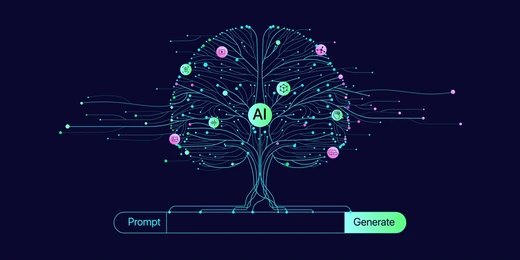
Generative AI in Transforming the Global Economy
Artificial Intelligence (AI) has emerged as a groundbreaking technology, revolutionizing various industries and transforming the way we live and work. One of the most promising advancements within AI is generative AI, which holds immense potential to contribute to the global economy. In this blog, we will explore the value generative AI brings to the economy, its impact on various sectors, and how it has the power to change the world.

Generative AI: Empowering Economic Growth
Generative AI refers to a subset of AI that focuses on creating and generating new content, such as images, text, and even music. By utilizing deep learning models and neural networks, generative AI systems have the ability to learn patterns and generate realistic and original outputs. This technology has the potential to revolutionize industries and drive economic growth in various ways.
The Impact on the Economy:
Generative AI has the potential to significantly impact the global economy. According to recent research, the introduction of generative AI across 63 analyzed use cases could potentially contribute an estimated $2.6 trillion to $4.4 trillion annually. To put this into perspective, this is equivalent to 15 to 40 percent of the United Kingdom’s entire GDP in 2021, which was $3.1 trillion. This staggering economic value showcases the transformative power of generative AI across sectors.
Contribution of AI to the Global Economy:
Artificial intelligence as a whole, including generative AI, is set to make significant contributions to the global economy. AI technologies enhance productivity, improve efficiency, and drive innovation in industries ranging from healthcare and finance to manufacturing and retail. By automating tasks, analyzing vast amounts of data, and providing valuable insights, AI unlocks new opportunities for businesses to thrive.
Generative AI, in particular, adds an extra dimension to the potential impact of AI. It enables the creation of new and unique content, which can have substantial implications across sectors such as creative industries, marketing, and design. The ability to generate high-quality images, videos, and text can streamline content creation processes, reduce costs, and enhance the overall customer experience.
The Importance of Generative AI:
Generative AI holds immense importance in the modern era due to several key factors:
a. Innovation and Creativity: Generative AI encourages innovation by automating the creation of original and creative content. It provides a platform for exploring new ideas, designs, and concepts that may have otherwise remained unexplored. By leveraging generative AI, businesses can push the boundaries of creativity and bring unique products and experiences to the market.
b. Efficiency and Productivity: Generative AI accelerates workflows and enhances efficiency by automating content generation processes. It frees up valuable human resources from repetitive tasks, allowing them to focus on more strategic and complex activities. This increased productivity leads to cost savings and improved operational performance.
c. Personalization and Customer Experience: With generative AI, businesses can tailor their offerings to individual customer preferences. Customized content and recommendations based on user data enable a more personalized customer experience. By understanding customer needs and preferences, businesses can enhance engagement and build stronger customer relationships.
Generative AI: Transforming the World
Generative AI has the potential to change the world in profound ways. Here are a few examples:
- Creative Industries: Generative AI empowers artists, designers, and musicians by providing them with new tools for expression. It opens up avenues for experimentation, collaboration, and the creation of entirely new art forms. From generating realistic artwork to composing original music, generative AI enhances the creative process and pushes the boundaries of human imagination.
- Healthcare and Drug Discovery: In the field of healthcare, generative AI can assist in drug discovery and development. By analyzing vast amounts of biological data, generative models can identify potential drug candidates and simulate their effects. This accelerates the process of finding new treatments and therapies, ultimately saving lives and improving patient outcomes.
- Sustainability and Climate Change: Generative AI can aid in addressing global challenges such as climate change. By analyzing environmental data, generative models can generate insights and solutions for sustainable practices. From optimizing energy consumption to designing eco-friendly infrastructure, generative AI has the potential to reshape industries and create a more sustainable future.
Conclusion:
Generative AI is poised to revolutionize the global economy, contributing billions of dollars annually across a wide range of sectors. Its ability to automate content generation, enhance creativity, and personalize experiences will drive economic growth, efficiency, and innovation. As generative AI continues to advance, it will unlock new opportunities, transform industries, and reshape our world for the better.












